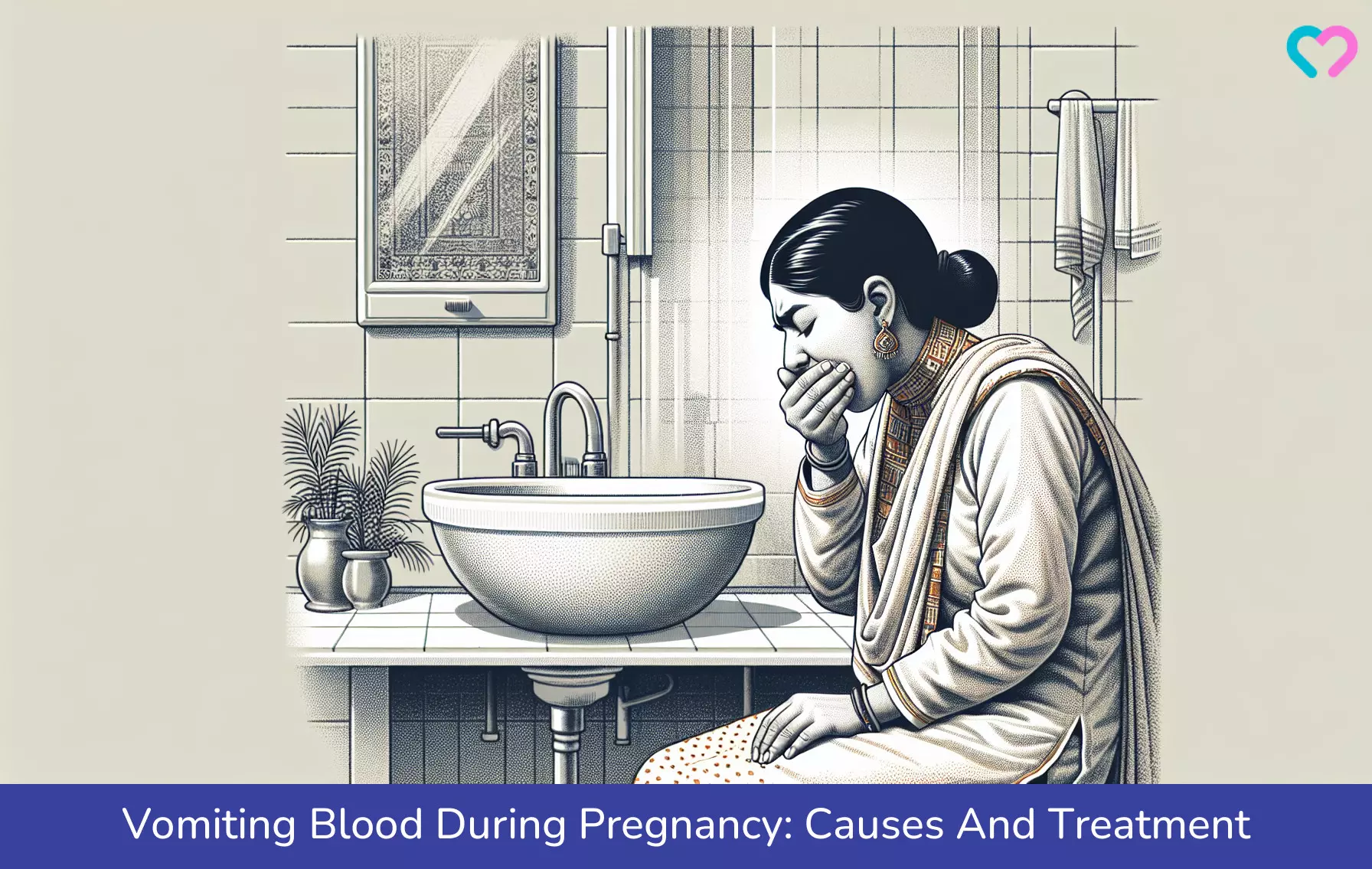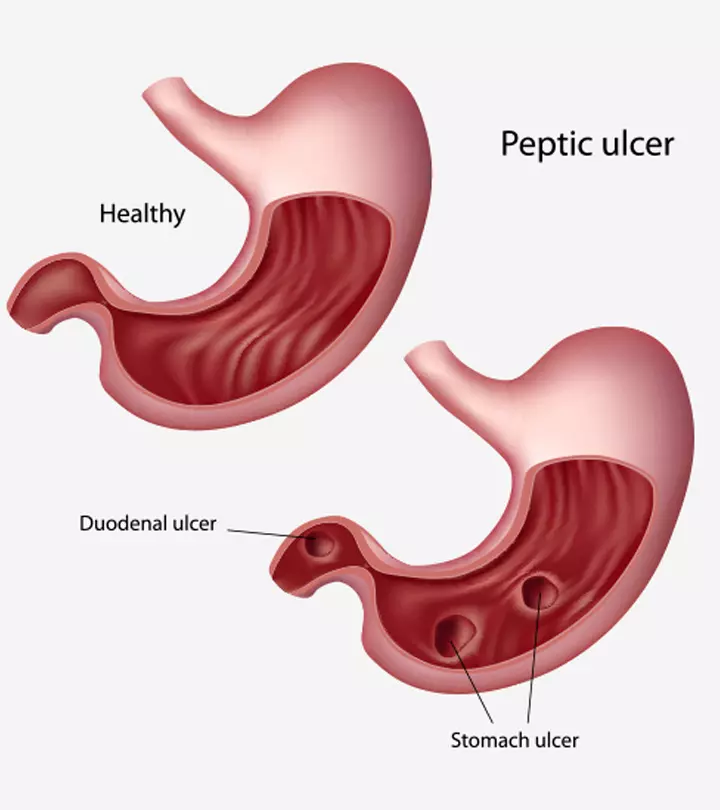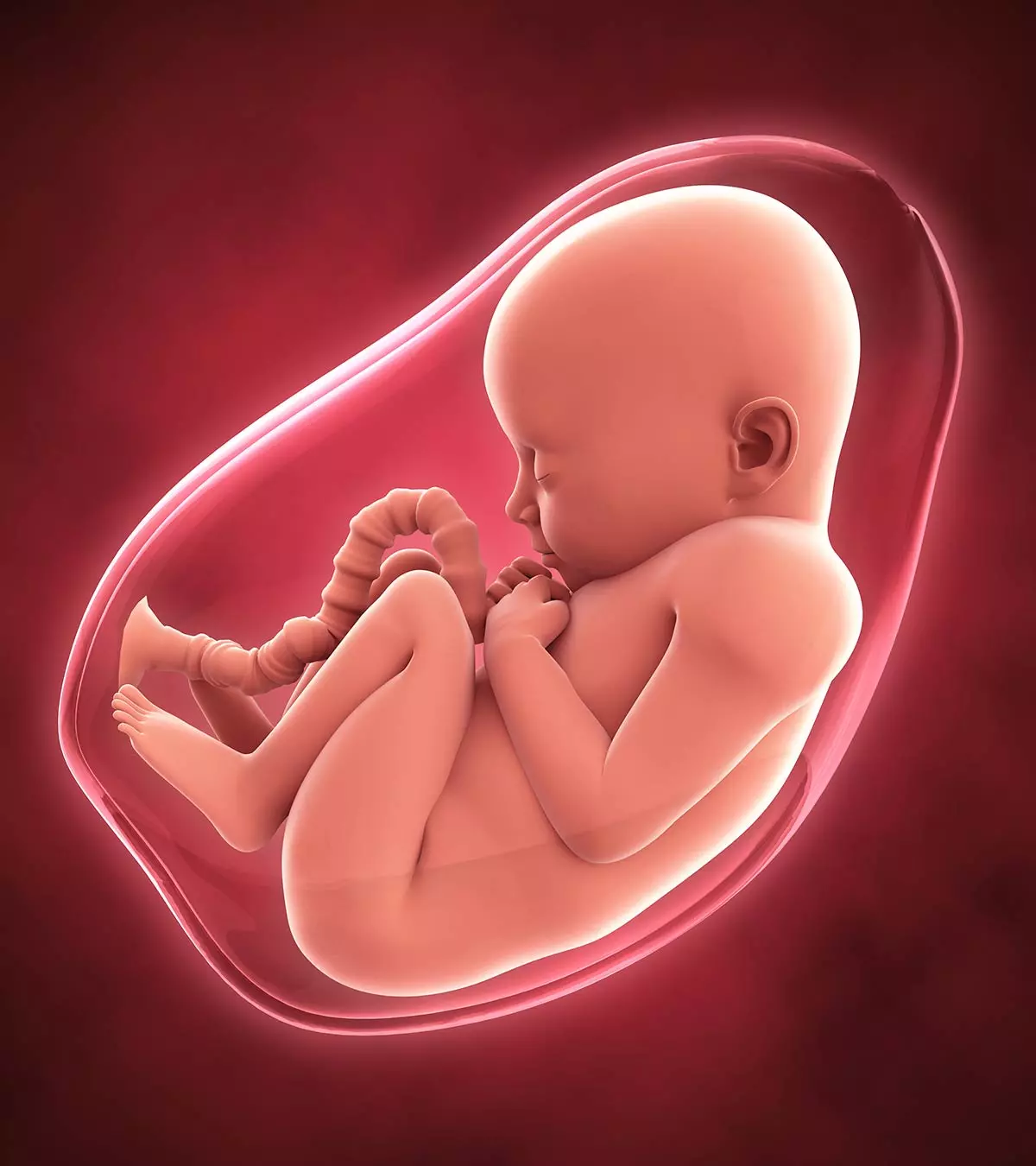
Image: ShutterStock
Morning sickness during pregnancy characterized by nausea and vomiting is common. However, blood in vomit during pregnancy, also known as hematemesis, may indicate an underlying problem.

The condition may be caused due to different reasons, such as a tear in the food pipe, peptic ulcer, irritated esophageal lining, and others. If you experience hematemesis, it is important to seek prompt medical attention.
Read the post for more information on the causes of hematemesis, the symptoms accompanying it, its diagnosis, complications, treatments, and things you can do at home to relieve the symptoms.
Key Pointers
- Pregnant women with hematemesis require immediate medical attention as it could indicate a serious condition.
- Hematemesis can be caused by conditions such as severe gastritis, peptic ulcers, poison ingestion, or cancer.
- Symptoms may include nausea, rapid heartbeat, blurred vision, dizziness, abdominal discomfort, and fainting.
- Hematemesis can lead to complications such as choking, aspiration, and anemia.
- Treatment for hematemesis will depend on the severity of vomiting and may include medication or hospitalization.
What Is Hematemesis (Vomiting Blood)?

Hematemesis refers to vomit that has a significant amount of bright red or gritty coffee ground blood. Usually, the bright red blood indicates any bleeding from the upper gastrointestinal tractiAlimentary or digestive tract. , mostly from the esophagus, stomach, or duodenumiFirst part of the small intestine. . Coffee-ground hematemesis occurs when the stomach acids convert hemoglobiniA protein found in red blood cells. to hematiniA discolored coffee-brown form of hemoglobin caused by gastric hydrochloric acid. (1).
Is It Normal To Vomit Blood During Pregnancy?
Vomiting blood during pregnancy is not normal, and you should see a doctor in case you are vomiting chunks of blood. It may happen when you have severe morning sickness that irritates the esophageal lining, thus leading to bleeding (2). Gastrointestinal infections or other severe diseases may also lead to blood in the vomit. Should you see blood in vomit during pregnancy, visit your doctor immediately for a proper diagnosis and remedy.
Vicina Lucinda, a mother of two, talks about her experience of vomiting blood while she was pregnant, “The nausea was quite intense, and I couldn’t sleep sometimes because of it. One day, I had to throw up, and I also threw up blood, and that scared me. I called my midwife the next day just to be sure, and she said that I had to keep an eye on it, but it was very common (ⅰ).’’
What Causes Hematemesis In Pregnancy?

The causes of blood in the vomit in pregnant women are the same as that of the general population (3).
Common causes are likely to be:
- Severe gastritis or peptic ulcer: Gastritis (inflammation of the stomach lining) or peptic ulcers or stomach ulcers (painful sores in the inner stomach lining) cause a burning sensation in your tummy and damage the artery. This could lead to blood vomiting. Stomach ulcer during pregnancy is characterized by the erosion of the protective lining of the digestive system due to a bacterial infection (22) (23).
- Esophageal varices: These are the enlarged veins in the lower esophagus (food pipe), which bleed but may not cause any pain. They could be caused due to elevated blood pressure (hypertension or preeclampsia) or alcoholic liver disease (liver is damaged due to long term alcohol exposure). If the doctor suspects this, that doctor may ask you to get admitted to the hospital immediately (24).
- Esophageal irritation: Prolonged retching can irritate the esophageal lining, resulting in bleeding that may appear in the vomit. Hyperemesis gravidarum (HG) is a medical condition that can lead to prolonged and intense retching. While rare, chronic and severe retching may lead to an esophageal rupture or tear. An esophageal tear called a Mallory-Weiss tear, occurs due to extreme pressure on the esophagus, which is not typically associated with HG. However, in extreme cases of vomiting, an esophageal tear may occur regardless of the underlying cause (4) (5).
Sara, a mother and blogger, shares how she began having severe vomiting around the fifth week of pregnancy and was diagnosed with an esophageal tear. She writes, “Approximately around 29 weeks, I went back into the ER for the same issue, of course… I happened to vomit while the nurse was doing her thing, and she was the first person to truly see how urgent my situation had become… “I was transferred to a bigger and better hospital that specializes in women’s health. I endured a 2-night stay, where they considered doing a scope on my throat to check for any problems. They ultimately decided not to do the scope, and concluded I had Mallory-Weiss tears in my throat from constantly vomiting so much (ii).”
- Gastro-esophageal reflux disease (GERD): GERD is a medical condition where stomach acids leak out from the stomach into the esophagus or food pipe. This is also known as acid reflux or reflux. Severe GERD can cause the esophageal lining to irritate and erode, resulting in bleeding (6). In expecting women, the growing uterus can increase pressure on the stomach and aggravate GERD symptoms, potentially leading to hematemesis.
- Nosebleeds: Blood volume during pregnancy increases by almost 50%, which puts pressure on the delicate blood vessels in the nose, increasing their susceptibility to rupture. Hormonal changes during pregnancy can cause nasal congestion, which can further increase the likelihood of nosebleeds. Swallowing blood from a nosebleed may result in vomiting blood during pregnancy (7) (8).
- Pregnancy gingivitis: During pregnancy, changes in estrogen and progesterone levels can make gums more sensitive to bacteria in plaque, leading to red, swollen, or bleeding gums (9). If a pregnant woman swallows this blood, it is possible that some of this swallowed blood appears as a part of the vomit during an episode of regurgitation.
- Mouth and throat irritation: Frequent or excessive vomiting can irritate the lining of the mouth or throat, resulting in minor bleeding, which may show up as traces of blood in the vomit (10). If you notice streaks of fresh blood or dark, dried blood in vomit during pregnancy, it might be due to bleeding in your throat or mouth.
Less common causes are likely to be:
- Swallowing poisons such as arsenic or corrosive acids
- Cancer of the stomach or esophagus
- Blood conditions such as thrombocytopeniaiA condition in which the platelet count is lower than normal, i.e., 150000/microliter (for adults). , hemophiliaiA bleeding disorder in which the blood does not clot properly. , leukemiaiA form of blood cancer that begins in the bone marrow. , and anemia
 Quick fact
Quick factSigns And Symptoms That May Accompany Blood Vomiting
Along with blood in vomit during pregnancy, you may experience some other symptoms depending on the cause of the bleeding. They could be (11):
- Nausea
- Rapid heartbeat
- Blurred vision
- Dizziness
- Confusion
- Fainting
- Clammy skin
- Reduced urine output
- Pain in upper abdomen
If any of these symptoms develop or worsen over time, reach out to your doctor to ensure timely treatment and prevent complications.
Diagnosis For Blood Vomiting During Pregnancy

According to experts, the presence of blood in vomit during pregnancy warrants prompt medical attention. It is because self-diagnosing its precise cause is not possible, and leaving the condition unattended holds potential risks. So, it is vital to see your healthcare provider if you notice blood in your vomit.
During the examination, your doctor may ask about the color of the blood and the history of any injuries you have had in the present or past. Diagnostic tests performed during pregnancy are similar to tests performed on non-pregnant women. Only your doctor can suggest the required imaging test to diagnose the actual cause.
Some of the imaging tests you may be recommended include:
- Ultrasound scan
- X-ray
- MRI scan
- EndoscopyiA medical procedure that allows a doctor to see inside the body using a camera attached to a long, flexible tube called an endoscope
- Nuclear medicine scaniA painless, non-invasive imaging test that uses a radioactive tracer to create pictures of the inside of the body
- Blood tests (2)
 Did You Know?
Did You Know?Complications Of Vomiting Blood
Some of the common complications of blood vomiting could be (12) (15):
- Choking is when the blood collects in the lungs and impairs your ability to breathe effectively.
- Aspiration, where vomited blood is again drawn in through airways.
- Anemia, a deficiency of red blood cells may develop when there is rapid blood loss through vomiting.
- Dehydration, where essential fluids and electrolytes are lost from the body.
To avoid these complications, pay attention when you are vomiting to check if there is blood, especially when you experience some of the symptoms mentioned above.
Treatment Of Hematemesis During Pregnancy
Management will depend on the severity of the vomiting.
In case of minimal blood loss, your doctor may prescribe medications. If there is significant blood loss, you might need a blood transfusion or a drip. In severe life-threatening cases, emergency resuscitation or a blood transfusion may be needed.
Treatment usually depends on the cause of blood vomiting. It may involve endoscopy to stop the bleeding by sealing an internal wound or emergency surgery to control severe bleeding (8).
Can You Prevent Throwing Up Blood While Pregnant?

Nausea and vomiting are common during pregnancy, but you can take a few measures to prevent them from becoming severe (a condition called hyperemesis gravidarum) and resulting in blood vomits (13).
- Maintain personal hygiene by washing your hands frequently before handling food, after using the toilet, or after handling trash or contaminated surfaces.
- Avoid being in contact with anyone who has gastroenteritisiSwelling of the stomach and intestines, which results in vomiting and diarrhea. .
- It’s important to restrict the consumption of specific medications like painkillers and aspirin, as they can lead to stomach inflammation and elevate the risk of bleeding (14).
- Do not prepare or handle food if you have GI infections.
- Avoid public pools if you have infections
- Avoid raw foods and cook meat thoroughly.
- Avoid spicy foods that cause stomach irritation or acid reflux.
- Quit smoking and alcohol
- Avoid overeating
- Avoid inducing vomiting when you have too much nausea
Home Remedies To Deal With Blood Vomiting

Vomiting blood during pregnancy may warrant strict medical supervision. Loss of blood makes your body weak, which is not good for your baby’s health. Moreover, bloody vomit also leaves an unpleasant feeling in your mouth.
Here are a few helpful remedies that might relieve you from the nauseous state in pregnancy:
- Saline water: Your body may be depleted of fluids or undergo dehydration after recurrent vomiting. You may have to get intravenous fluids or ORS (oral rehydration solutions) that have electrolytes to gain the lost fluids and recover.
- Drink lots of water: Consider drinking more water, fruit juices, and electrolyte solutions to recover from dehydration.
- Eat a well-balanced diet: A proper diet gives you the right amounts of essential nutrients and minerals to keep you healthy and avoid nutritional deficiencies. You may feel nauseated when you wake up in the morning. Eating a toast or cracker might mitigate the feeling and could also offer energy.
- Avoid oily food, eat less: Stay away from fatty or spicy foods that could trigger bouts of vomiting during pregnancy. It is better to have boiled and somewhat bland foods. Eat small portions throughout the day and avoid eating large quantities before sleeping.
- Rest enough: Nausea due to vomiting can create stress, lack of sleep, and fatigue. Rest as much as you can and avoid stress as it could help in healthy fetal growth too (15).
 Point to consider
Point to considerIs Vomiting Blood A Sign Of Miscarriage?
Blood in vomit during pregnancy is not a sign of miscarriage. Vaginal bleeding, discharge, cramping, and a feeling of weakness are the usual symptoms you may experience in case of a miscarriage (17).
Frequently Asked Questions
1. Can vomiting cause a miscarriage?
Studies confirm that vomiting is linked with a 50% to 75% decrease in the risk of pregnancy loss (18). Vomiting usually goes away by 14 weeks of pregnancy; however, for some women, it may last throughout pregnancy. Vomiting during pregnancy becomes a problem only when it is impossible to keep down food or fluids, and rapid weight loss is experienced (19).
2. Will vomiting affect my baby?
Studies indicate that nausea and vomiting during pregnancy may reduce nutrition availability to the fetus, thus increasing the risk of low birth weight in babies. However, more studies are required to confirm this fact (20).
3. Will folic acid make me vomit during pregnancy?
No, folic acid supplements work well to combat vomiting during pregnancy. So, if you stop taking other multivitamin supplements to reduce your nausea and vomiting, doctors may advise taking 400 micrograms of folic acid daily (21).
Blood in vomit during pregnancy is not normal, and it requires medical attention. It could be bright red, indicating gastrointestinal bleeding or bleeding from the upper gastrointestinal tract, such as the esophagus. Blood from the stomach may appear coffee ground color due to stomach acids. Sometimes this can be due to severe morning sickness causing tears or irritation of esophageal tissue resulting in bleeding. Always seek medical care if you notice blood in vomit since gastrointestinal infections and other conditions can cause hematemesis.
Infographic: Reasons Why You Might Vomit Blood While Pregnant
There are several weird pregnancy-related complications, including nausea and vomiting throughout gestation. But, if you notice blood in the vomit (hematemesis), it could indicate an underlying issue. Look at the infographic below to learn about all the possible causes that may lead to blood vomiting while pregnant. Illustration: Momjunction Design Team
Illustration: Vomiting Blood During Pregnancy: Causes And Treatment

Image: Stable Diffusion/MomJunction Design Team
Vomiting blood during pregnancy can be a scary experience. Learn what it means, its causes and how to manage this condition, in this video.
Personal Experience: Source
MomJunction articles include first-hand experiences to provide you with better insights through real-life narratives. Here are the sources of personal accounts referenced in this article.
ⅰ. Pregnancy update week 11; Throwing up blood; Vicina Lucindahttps://www.youtube.com/watch?v=TXEJo6qkK3E
ii. Worst Pregnancy of All Time
https://medium.com/@mindofmercury/worst-pregnancy-of-all-time-e7d9a2da0c27
References
- Chapter IX.10. Gastrointestinal Bleeding and Peptic Ulcer Disease.
https://www.hawaii.edu/medicine/pediatrics/pedtext/s09c10.html - Vomiting blood.
https://medlineplus.gov/ency/article/003118.htm - Vomiting blood (haematemesis).
https://www.nhs.uk/conditions/vomiting-blood/ - Hyperemesis Gravidarum.
https://my.clevelandclinic.org/health/diseases/12232-hyperemesis-gravidarum - Mallory Weiss Tear.
https://my.clevelandclinic.org/health/diseases/22035-mallory-weiss-tear - Heartburn and gastro-oesophageal reflux disease (GORD).
https://www.nidirect.gov.uk/conditions/heartburn-and-gastro-oesophageal-reflux-disease-gord - Nosebleeds While Pregnant.
https://my.clevelandclinic.org/health/symptoms/22342-nosebleeds-while-pregnant - Vomiting Blood.
https://my.clevelandclinic.org/health/symptoms/17708-vomiting-blood - Pregnancy Gingivitis.
https://my.clevelandclinic.org/health/diseases/22484-pregnancy-gingivitis - Esophagitis.
https://my.clevelandclinic.org/health/diseases/10138-esophagitis - Hematemesis.
https://muschealth.org/medical-services/ddc/patients/symptoms-and-conditions/hematemesis - Gastrointestinal Bleeding.
https://www.ncbi.nlm.nih.gov/books/NBK537291/ - Symptoms-Miscarriage.
https://www.nhs.uk/conditions/miscarriage/symptoms/ - Wabe NasirTajure and Chalelgn Kassaw et al; (2012); Pregnant Women and Non-steroidal Anti-inflammatory Drugs: Knowledge Perception and Drug Consumption Pattern During Pregnancy in Ethiopia.
https://www.ncbi.nlm.nih.gov/pmc/articles/PMC3296322/ - Diarrhoea and vomiting.
https://www.healthywa.wa.gov.au/Articles/A_E/Diarrhoea-and-vomiting - Severe Morning Sickness (Hyperemesis Gravidarum).
https://kidshealth.org/en/parents/hyperemesis-gravidarum.html - Miscarriage.
https://www.marchofdimes.org/find-support/topics/miscarriage-loss-grief/miscarriage - Your mom was right: “Morning sickness” means a lower chance of miscarriage.
https://www.health.harvard.edu/blog/your-mom-was-right-morning-sickness-means-a-lower-chance-of-miscarriage-2016102110493 - Morning Sickness: Nausea and Vomiting of Pregnancy.
https://www.acog.org/womens-health/faqs/morning-sickness-nausea-and-vomiting-of-pregnancy - Petry Clive J. et al.; (2018); Vomiting in Pregnancy Is Associated With a Higher Risk of Low Birth Weight: A Cohort Study.
https://bmcpregnancychildbirth.biomedcentral.com/articles/10.1186/s12884-018-1786-1 - Nausea and Vomiting During Pregnancy.
https://onlinelibrary.wiley.com/doi/10.1111/jmwh.12451 - Gastritis.
https://www.nhs.uk/conditions/gastritis/ - Overview -Stomach ulcer.
https://www.nhs.uk/conditions/stomach-ulcer/ - Esophageal Varices.
https://my.clevelandclinic.org/health/diseases/15429-esophageal-varices
Community Experiences
Join the conversation and become a part of our nurturing community! Share your stories, experiences, and insights to connect with fellow parents.
Read full bio of Dr. Sangeeta Agrawal
Read full bio of Rebecca Malachi
Read full bio of Swati Patwal
Read full bio of Dr. Joyani Das

















